#because this law is a violent act against all women
Text

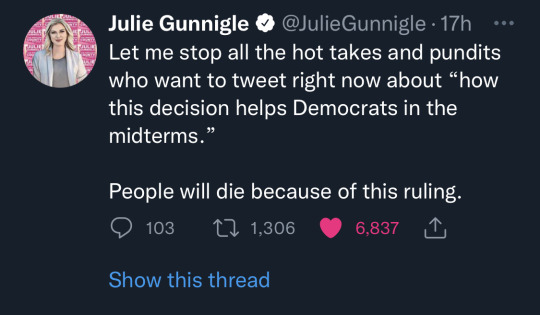
The first should be this judge.
#when did we stop reacting to violence with violence#because this law is a violent act against all women#men who want to control women and treat them as livestock have forfeited their right to life#in my opinion#continuing to tolerate these hateful pieces of shit will only make it harder to dig ourselves out of the hole they are burying us in#roe v. wave#dobbs decision#arizona#abortion ban#abortion access#abortion is healthcare
11 notes
·
View notes
Note
I don't think I have it in me to be an abolitionist because I read that horrible story about the trans teen murdered in South Carolina and my knee jerk reaction is, those people should rot in jail, ideally forever, or worse. No matter how I look at it I can't make myself okay with the idea that you should be allowed to steal someone's life in such a horrible way and then just go back to enjoying your life. Some stuff is just too over the top evil.
You can have whatever emotions you want about that person's murderous actions, but the reality is that the carceral justice system is one of the largest sources of physical, emotional, and sexual torment for transgender people on this planet.
Transgender people are ten times more likely to be assaulted by a fellow inmate and five times more likely to be assaulted by a corrections officer, according to a National Center for Transgender Equality Report.
Within the prison system, transgender people are frequently denied gender-affirming medical care, and housed in populations that do not match their identity, which increases their odds of being beaten and sexually assaulted.
The alternative to being incorrectly housed with the wrong gendered population is that transgender people are also frequently held in solitary confinement instead, often for far longer periods on average than their non-transgender peers, contributing to them experiencing suicide ideation, self harm, acute physiological distress, a shrunk hippocampus, muscculoskeletal pain, chronic condition flare-ups, heart disease, reduced muscle tone, and numerous other proven effects of solitary confinement.
The prison system is also one of the largest sites of completely unmitigated COVID spread, among other illnesses, with over 640,000 cases being directly linked to prison exposure, according to the COVID prison project.
We know that number is rampantly under-estimated because prisoners, especially trans ones, are frequently denied medical care. And even basic, essential physical care. Just last year a 27-year-old Black man named Lason Butler was found dead in his cell, having perished of dehydration. He had been kept in a cell without running water for two weeks, where he rapidly lost 40 pounds before perishing. His body was covered in rat bites.
This kind of treatment is unacceptable for anyone, no matter who they are and what they have done, and I shouldn't have to explicitly connect the dots for you, but I will. One in six transgender people has been to prison, according to Lambda Legal. One in every TWO Black transgender people has been to prison. One in five Black men go to prison in America.
THIS is the fate you are consigning all these people to when you say that prisons must exist because there are really really bad people out in the world. We should all know by not that this is not how the carceral justice system works. Hate crime laws are under-utilized, according to Pro Publica, and result in few convictions. The people who commit transphobic acts of violence tend to be given softer sentences than the prisoners who resemble their victims.
We must always remember that the violent tools of the prison system will be used not against the people that we personally consider to be the most "deserving" of punishment, but rather against whomever the state considers to be its enemy or to be a disposable person.
You are not in control of the prison system and you cannot ensure it will be benevolent. You are not the police, the judge, the jury, or the corrections officers. By and large, the people who are in these roles are racist, transphobic, ableist, and victim-blaming, and they will use the power and violence of the system to terrorize people in poverty, Black people, trans people, "mad" people, intellectually disabled people, women, and everyone else that you might wish to protect from harm with a system of "punishment." Nevermind that incaraceration doesn't prevent future harm anyway.
You can't argue for incarceration as the tool of your revenge fantasies, you have to argue for it as the tool that it actually is. The purpose of a system is what it does. And the prison system's purpose has never been to protect or avenge vulnerable trans people. It has always been to beat them, sexually assault them, forcibly detransition them, render them unemployable, disconnect them from all community, neglect them, and unperson them.
779 notes
·
View notes
Note
Pick a favourite moment for each straw hat
THERE ARE SO MANY ANON...god I will try
Luffy: When Luffy talks to Law in Punk Hazard and he says "Hey, are you gonna betray me?" and Law says "No" and Luffy has this fuckass grin dgjhkd

Zoro: When he's been found in Dressrosa with the Tontatta's and he's watching the colosseum fight with them like a fucking sport it was so funny to me dfjgkd Zoro overall was so funny in Dressrosa

Nami: When she slaps the SHIT out of Zoro cause he was acting rude to Lola and she was NOT having it I love her evil, violent women moments

Usopp: The Sugar scene where he defeats her because he made an absolutely horrid face I was belly laughing sm what an Usopp core moment truly
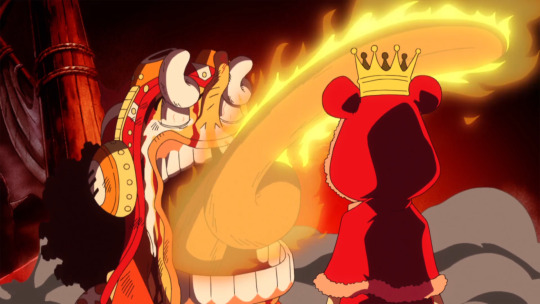
Sanji: The entire Black Maria scene do I even need to say why honestly
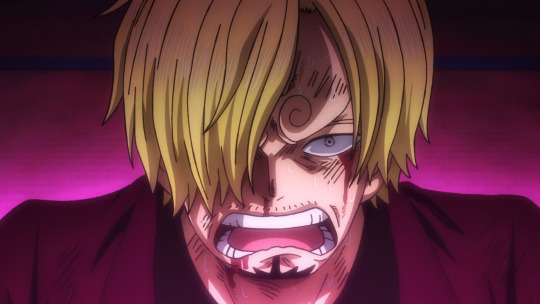
Chopper: When he was pissed at Zoro taking his bandages off in Thriller Bark and starts rapid bandaging him up with Zoro complaining HJGJKD

Robin: When Franky is in Chopper's body making faces and she says "Franky DO NOT fucking BREATHE I will KILL YOU"

Franky: When the kids in Punk Hazard think he's really cool and he takes the chance to show off to them dgjdl
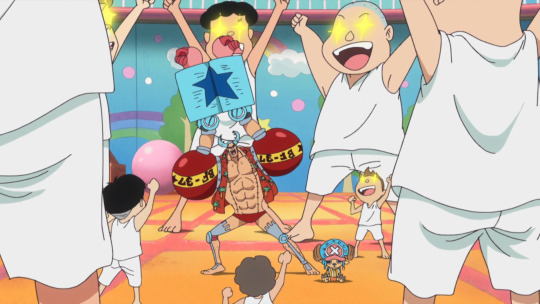
Brook: When Franky offers Robin a ride on onigashima but instead Brook sits on his bike and says "How about a little bromance?" LMAOOO
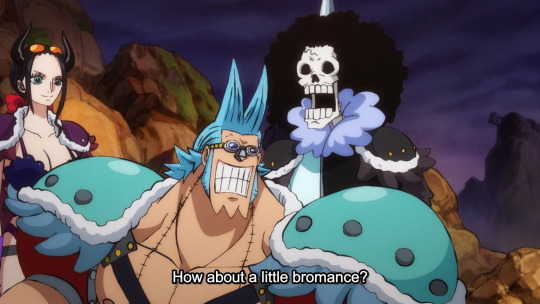
Jimbei: in Fishman Island when Zoro and Sanji start fighting against each other and Jimbei is BEFUDDLED and is like "what the hell is wrong with them" JHDFGK

Maybe these aren't my favourite favourites but I remember all of these scenes so well and so dearly lol
728 notes
·
View notes
Text
Scotland’s education secretary ordered a conference on school violence within 48 hours of being sent a video of a girl being lured into a changing room, temporarily blinded with Coke and beaten about the head and face as classmates watched.
Jenny Gilruth and other ministers were bombarded with emails and letters cataloguing assaults on pupils before they decided to act on the problem.
At one point in early 2023, parents, youngsters and staff were sending messages, often containing videos of attacks from social media, several times a week, according to more than 100 pages of correspondence released to The Scotsman under freedom of information laws.
The video of the child being thrashed in the changing room was sent to Gilruth after she took up her job, by a distraught parent who said their daughter had been the victim of “a premeditated attack”.
They feared their child’s life was “at risk”, when — unable to see because of the soft drink in her eyes — other pupils started “kicking her in the face and head, bouncing her head off a wall and kicking her in other areas”.
Other parents outlined allegations of sexual assault, of a primary pupil who was “dragged” into school toilets before being kicked unconscious, and of an assault so serious it “could easily have left the pupil for dead”.
Gilruth, a former teacher, was appointed in March and ordered her summit in May. The government has announced a series of responses.
A study in November found two thirds of staff at more than 500 Scottish schools surveyed had encountered verbal abuse in the previous week. Another 59 per cent had dealt with violence between pupils in the past seven days.
The study’s authors described “pupils persistently infringing rules, making cheeky or impertinent remarks, engaging in general rowdiness, mucking about and deliberately excluding others”. Discipline, the experts authors concluded, had got worse since 2016.
The official report raised particular concern about behaviour at primary schools, which was also reflected in messages to ministers. A parent got in touch with the government to describe a “drastic increase in the level of bullying and violence within the school grounds” at one primary.
Much of the debate on school violence has focused on controversy around low levels of exclusions. School leaders tend not to send disruptive students home, preferring what is called “restorative practice”.
This stance was raised by some of those complaining to the government. “The policy is not working. It is creating tensions between education staff, police and the community,” one correspondent said.
Some teachers and psychologists argue that excessive use of exclusions and suspensions can cause more trouble.
There are also concerns about internet culture, with many incidents being filmed and uploaded to social media and some episodes of bullying or violence being linked to online bigotry against women and girls or minorities.
A Scottish government spokesman said: “Scotland’s schools should be safe learning environments for all. Violent and abusive behaviour towards pupils or staff is completely unacceptable.
“The education secretary has been clear that this must be improved, and has set out five steps to address concerns around behaviour, including bringing forward a national action plan to set out a range of actions at national, local and school level, and a dedicated approach to responding to issues surrounding misogyny.”
61 notes
·
View notes
Text
47 Northwestern faculty
October 27, 2023
This letter is in response to the “Open letter on NU leaders’ responses to war in Palestine and Israel” published in the Oct.16 edition of The Daily.
The Oct.16 letter gave the impression that the reasons civilians were killed by Hamas and by the Israel Defense Forces were the same, but whereas Hamas murdered civilians intentionally, the IDF were defending their citizens and homeland. The original 1988 Hamas charter (Covenant of the Islamic Resistance Movement) and guidelines to mosque preachers from the Palestinian Authority last week — according to Palestinian Media Watch and Jihad Watch — specifically state that Hamas’ mission is the annihilation of Jews and the complete destruction of Israel and the establishment of a theocratic state based on Islamic law. While Hamas amended its charter in 2017 to remove explicit mention of annihilation of Jews, we believe that mission is still intrinsic to their movement.
In 2005, Israel withdrew all soldiers and civilians from Gaza to reduce friction and enhance security. Two years later, Hamas violently overthrew the Palestinian Authority and took over the territory. Since then, terrorists have fired over tens of thousands of rockets indiscriminately at Israeli civilians, according to the Associated Press. This has led to multiple wars, and both Israel and Egypt needed to maintain a blockade to prevent weapons smuggling into Gaza.
On Oct. 7 Hamas members intentionally slaughtered and eviscerated civilian men, women and children — as their 1988 charter and directives to preachers demand — and they raped women, according to the IDF. In the Oct. 16 open letter, the authors say the number of rockets Israel dropped in the first week of the war exceeded how many rockets terrorists had dropped, as if it was disproportionate. Based on a rule of proportionality, which is irrelevant in war, the IDF would be justified in committing as many horrific acts against Gazans as Hamas has against Israeli citizens. This is absurd.
The IDF has said it does everything possible to avoid killing Palestinian civilians, such as forewarning civilians to move out of a particular area by dropping leaflets, putting messages on social media and making phone calls. Yet, a significant number of Palestinian civilians are still killed. Why? The Washington Post has reported Hamas hides and fires its munitions in civilian areas, including hospitals, schools and homes, and uses civilians as human shields. Because of this, the IDF has diverted missiles. The IDF has also said Hamas is responsible for blocking civilians from traveling south to what the IDF said would be a safe zone.
The open letter’s depiction of “the blockade and humanitarian stranglehold on the Gaza strip since 2007” by Israel ignores the IDF’s assertion that a blockade is necessary to prevent terrorists from entering, which occurred prior to the blockade. The blockade is a way for Israel to protect its citizens from harm.
Gaza gets hundreds of millions of dollars each year for humanitarian purposes, but much of this money does not reach the civilian population, the Wall Street Journal reported. Hamas uses it for military purposes, which contributes to poverty among civilians. Hamas was named the third richest terror group in the world by Forbes Magazine in 2018. International aid “was designed to be humanitarian in nature, but money is fungible, and that also allows Hamas to divert money from providing for its people to support the war machine,” Alex Zerden, a former senior U.S. Treasury national security official, said in the Wall Street Journal. If Hamas had used this money to build infrastructure and support businesses, Gaza would be in a much better position.
Although we grieve for the loss of all innocent lives, the loss of life is on the bloodied hands of Hamas. There are not two sides to barbaric behavior. Hamas is displaying unimaginable evil that is unacceptable in any civilized society, and there is no justification for pure evil.
Richard B. Silverman, Departments of Chemistry, Molecular Biosciences, and Pharmacology
Morton O. Schapiro, President Emeritus, Northwestern University
Henry Bienen, President Emeritus, Northwestern University
David N. Seidman, Department of Materials Science and Engineering
James A Sauls, Department of Physics and Astronomy
Philip Greenland, Department of Preventive Medicine
Harris Perlman, Department of Medicine
Raymond Glassenberg MD Department of Anesthesiology
Jonathan B Ida, Department of Otolaryngology
Richard J. Miller, Department of Pharmacology
Michael R. Wasielewski, Department of Chemistry
Rose Shoshanah Seidman, Selector and Cataloguer
J. Samuel Tenenbaum, Pritzker School of Law
Thomas Meade, Department of Chemistry and Molecular Biosciences
Brian M. Hoffman, Department of Chemistry
Lewis J. Smith, Department of Pulmonary and Critical Care Medicine
Tobin J. Marks, Department of Chemistry
Tamar Seideman, Department of Chemistry
Ben Z. Katz, Department of Pediatrics
Oren Lakser, Department of Pediatrics
Mercouri G Kanatzidis, Department of Chemistry
Julio M. Ottino, Department of Chemical and Biological Engineering
George C. Schatz, Department of Chemistry
Lee P. Shulman, Department of Obstetrics and Gynecology
P. Hande Ozdinler, Department of Neurology
Neil J. Stone, Department of Cardiology
Kenneth Poeppelmeier, Department of Chemistry
Chad A. Mirkin, Department of Chemistry
Joseph L. Schofer, Department of Civil and Environmental Engineering
Joel Shalowitz, Department of Preventive Medicine
Yohanan Petrovsky-Shtern, Department of History
William Klein, Department of Neurobiology
Milan Mrksich, Department of Chemistry and Biomedical Engineering
Gary Saul Morson, Department of Slavic Languages and Literatures
Mark C. Hersam, Department of Materials Science and Engineering
Elie Rekhess, Visiting Professor, Department of History
Samuel I. Stupp, Department of Chemistry and Materials Science and Engineering
William P. Halperin, Department of Physics and Astronomy
Efraim Benmelech, Kellogg School of Management
Joel Mokyr, Department of Economics and History
Igor Jerome Koralnik, Department of Neurology
Eddie Dekel, Department of Economics
Martin Eichenbaum, Department of Economics
William A. Muller, Department of Pathology
Lauren S. Wakschlag, Department of Medical Social Sciences
Irwin Benuck, Department of Pediatrics
Benayahu Elbaz-Eilon, Department of Neurology
50 notes
·
View notes
Text
thank you so much to everyone who has taken the time to read this post of mine and reblog and share your thoughts and send me messages about it, i really appreciate it. a few more thoughts below the cut but i wanted to say that first!
i feel like what i wrote the other day could be interpreted as derogatory towards the show and a byproduct of patriarchal writing that should have been different, and while there are many aspects of the show that are, i don't personally view it that way.
mulder and scully each have different reactions to violence that are rooted in different experiences, and from different points of view. this isn't a bad thing, this is the thesis of the story, but it is gendered. it is a position of privilege to wonder about exploitation. to be able to study and investigate it and desire to understand it, without it being personal. without having to confront that it could have easily been you, without having to reconcile that it has been you in the past. without having to incorporate those feelings and triggers into the process.
this grounds the characters, and is a very honest aspect of exposure to gendered violence, and the brutalization of women in particular, which is something that is rampant in both our world and the world of the x files.
more than any other defining characteristic, mulder understands the world that he lives in. he understands the systems that are in power, and he understands that certain people are more vulnerable, and aren't seen by those systems.
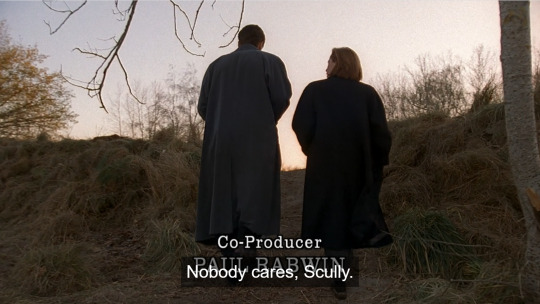
women, children, people of color, people with different experiences or abilities, are all disregarded by the world at large, seen as disposable, and not listened to. this is something that mulder expresses frustration about regularly, often repeating the sentiment that "nobody cares," such as with possible murders of migrant workers (el mundo gira), the deaths of black men (teliko), the abuse of haitian refugees (fresh bones), etc.

he knows that the FBI, and the government in general, are not interested in the victims, and are not interested in believing and listening to and helping everyone. the majority of his character and the majority of the show is spent focusing on those people, and refusing to accept the systems that ignore them.
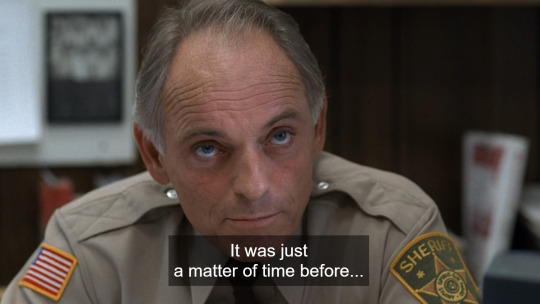

this extends to local law enforcement, as virtually all of the confrontations that mulder has in any given episode are pushing back against cops, who are rarely supportive in his investigations. a stand-out to me is here in conduit, the sheriff who spends the entire episode dismissing the disappearance of a teenage girl, because she was "no prom queen" who drank and slept around, and her mom had a reputation of being crazy.
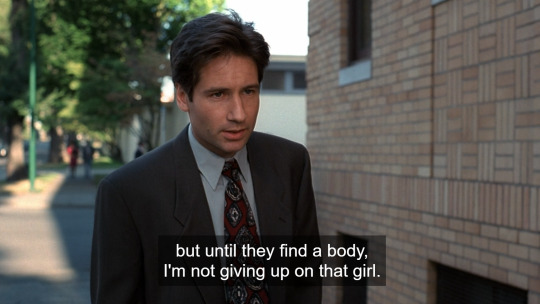
this is contrasted throughout the episode with mulder's obsessive dedication to trying to find her, advocating for her, and taking her mother seriously.
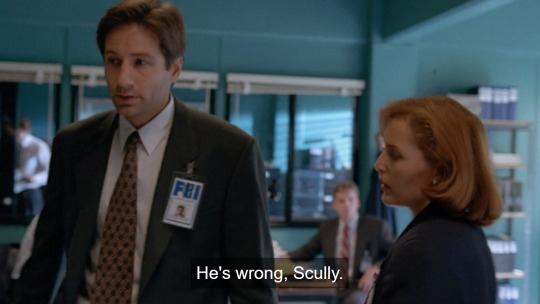

this is something that he does often, and notably when law enforcement treats victims (mostly women, sometimes teenagers, such as in schizogeny) as suspects, and tries to incriminate them rather than defend them (oubliette, mind's eye, terms of endearment, etc.)

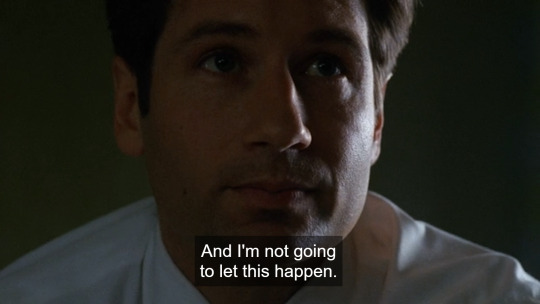
as @iconicscullyoutfits wrote in her analysis of blood, "he always knows when someone is a victim despite seeming like a villain by all accounts."
in blood, he tells a woman who beat her mechanic to death that he wants to help her, and he cries out in her defense when a cop responds with deadly force to her attacking mulder. after she nearly kills him, he instantly turns his attention to the systems that caused her to act violently, and figures out that the town was being poisoned through pesticide, in what was likely a government experiment.
mulder was regarded as a brilliant analyst for his uncanny ability to always know who (or what) is responsible for the violence that he bears witness to, whether that be as the genius golden boy of the violent crimes division or spooky mulder in the basement, but that extends to an implicit understanding of how that violence came to be. what the systems are that enable it, and who the true victims are as well.
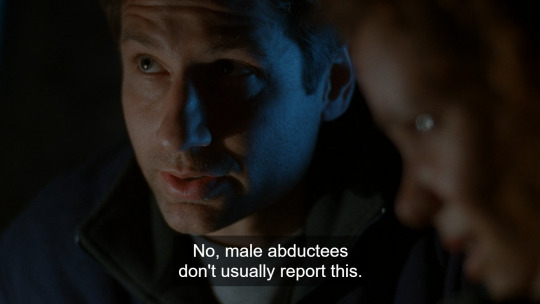
and the true victims, from the violent crimes division to the basement x-files to the government conspiracy, are often vulnerable and preyed upon groups. in the government/syndicate project, it's almost always women who are abducted, it is only women who come back with implants, and it is only women who get terminally sick as a result. it's women who have their bodily autonomy violated and who are stolen from and who are used for biological material. it's low-income areas who are targeted with military experiments, and who are used for the testing of military technology.
in deep throat, in conversation about government secrets, mulder asks scully, "when does the human cost become too high in the building of a better machine?" and the human cost is high and specific.
the specific targeting of women is something that mulder has been exposed to from every angle for his entire career, and while he has a less personal reaction to scully's, it is often also an emotional one
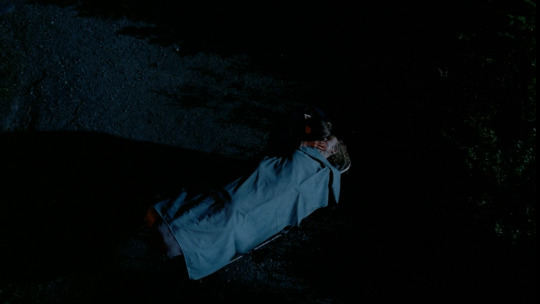
in oubliette, he openly weeps over the body of lucy householder, a kidnapping survivor who was a drug addict with convictions of prostitution and narcotic possession
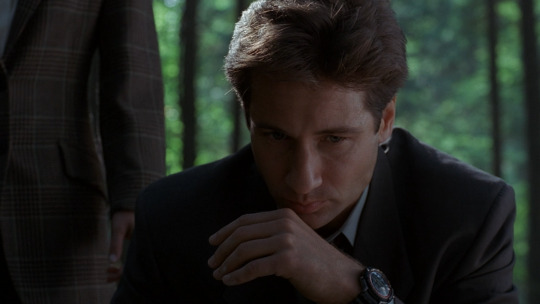
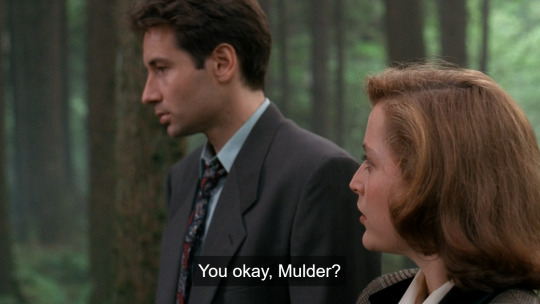
in conduit, he visibly shakes and tears up when they find a grave that might belong to a missing girl
the victimization of women, children, and people otherwise viewed as disposable by society is an emotional issue to mulder, whose entire life is predicated on the person closest to him having been viewed as expendable to the government, to his parents, and to society.
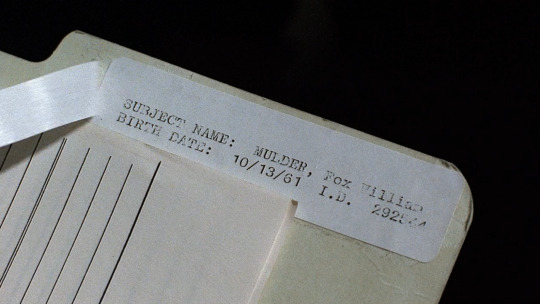
samantha was sacrificed to the project instead of mulder, and her file originally had his name on it, a realization that he never gets over or stops trying to make up for. the realization that she was given up in his place.
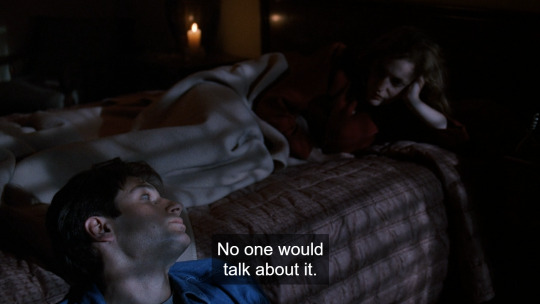
when samantha went missing, their parents responded by pretending that she had never existed. the "investigation" into her disappearance was closed, and everyone attempted to move on with their lives as though nothing had happened, as though she had never mattered.
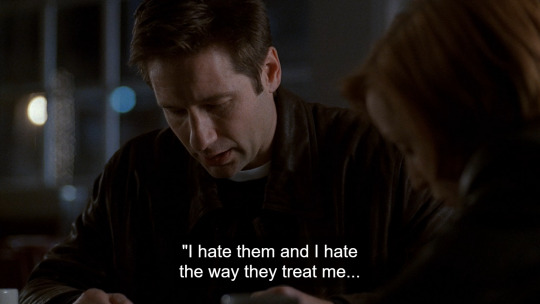

the people that she was being held by, government men on a military base, treated her as less than human

their mother burned photos of her
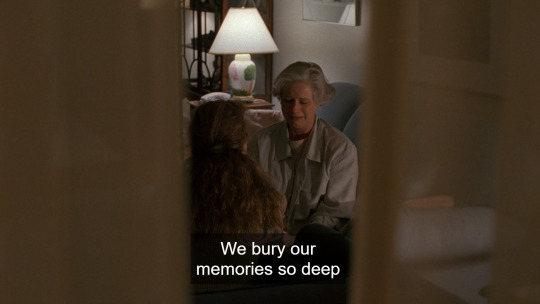
their father references "burying memories," and both bill and tena spend the rest of their lives trying to bury the truth about what happened to her
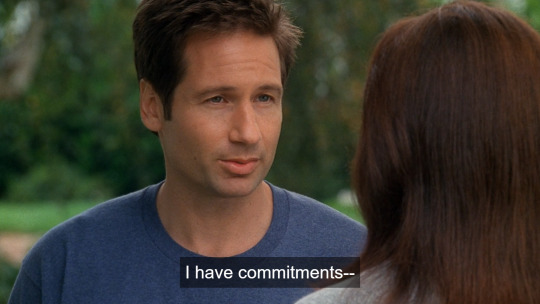
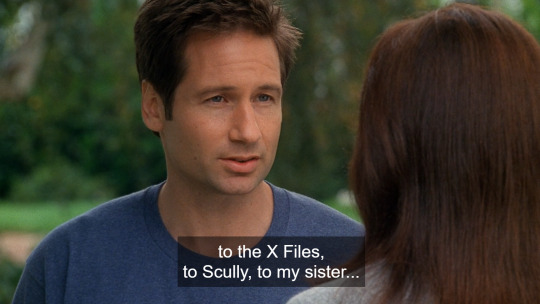
whereas mulder, in the pilot, looks at scully and tells her that "nothing else matters" to him. he views himself as committed to his sister, as having a responsibility to her, and he always surrounds himself with photos and memories of her. proof of her existence and the meaning behind his life's work.
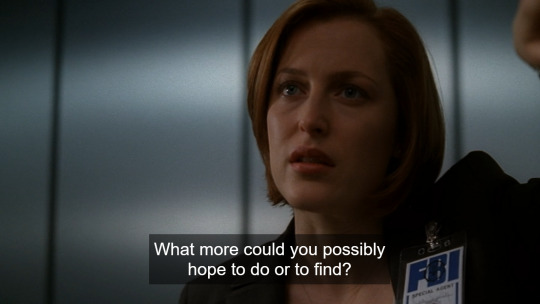

he never stops looking for her in everything, in every room, in every victim
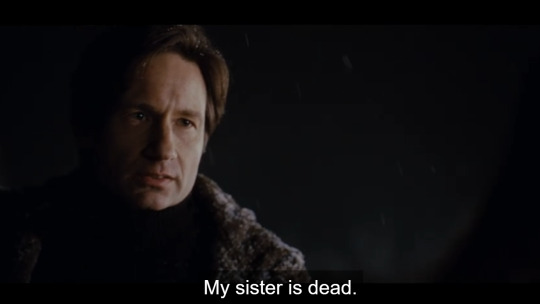
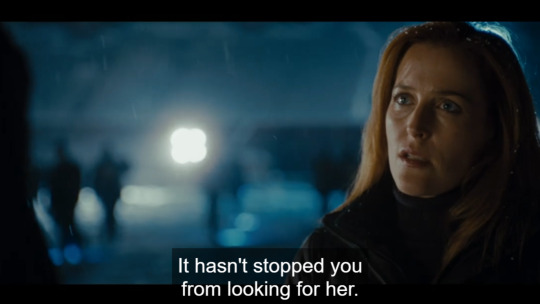
even years and decades after knowing and confirming that she's dead


and he extends that commitment and that compassion to every victim that he comes across. while they might not be samantha, they're somebody, and he's just as affected by the injustices that others suffer.


he's never willing to accept that this is just how the world he (and we) live in works, that the person who was everything to him was nothing to those in power, and he extends that indignation to the women who came before her

and who come after her
while his response to violence might be one of a privileged viewpoint, it isn't one of detachment, because he makes sure that it isn't. a little girl was sacrificed so that this wouldn't have to be his burden, so that the fact that people are sacrificial wouldn't be his problem, and he takes it on anyway.
he chooses to see the reality of the world, to not turn a blind eye, and he's never ever okay with it
#mulder apologia on main#it's not apologia if it's true <3#i cited my sources#i adore him to pieces#thank you again everyone
139 notes
·
View notes
Text
[“Some feminists are concerned that decriminalisation will make it harder to tackle exploitation and punish abusers. On the contrary: it is criminalisation which means that sex workers must hide from the police for fear of penalties such as arrest, eviction, or deportation.
Abusers know that sex workers cannot call on the state for help and are unlikely to be taken seriously in the occasional instances that we do. The criminalisation of prostitution drives violence against all women; criminalised sex workers become a ‘training ground’ where violent men can experiment with perpetrating violence, safe in the knowledge that their targets are unable to protect themselves or to get justice. Having ‘practiced’ on sex workers, such men often then move on to non–sex working women – a pattern we see in predators like Peter Sutcliffe and Adrian Bayley.
Many worry that if we allow the sex industry to exist without prohibition, we are condoning it and it will proliferate. This concern arguably reveals an unspoken belief that keeping prostitution dangerous – through making it illegal – acts as a useful downward pressure what might otherwise be an ‘unchecked’ tendency to sell sex. (Occasionally, this ‘unspoken’ belief is spoken: when sex workers met with the Irish justice minister to argue that criminalisation would make them less safe, the minister responded by observing that sex workers’ increased vulnerability to violence would at least deter women from entering the trade.)
It is worth noting that the number of sex workers in New Zealand has remained stable – the ‘explosion’ predicted in some quarters has not materialised. There is no evidence that changes to criminal law – including its removal – have a significant impact on the numbers of people who sell sex. As sex worker Jenny tells researchers,
I’ve worked illegally in other jobs, you know, I’ve worked under the table and that sort of thing. So … I guess I would say I probably would have done it [sex work] anyway. But, you know, I certainly felt that because it was legal … I felt more safer about it.
Nonetheless, conversations in feminist spaces become a tug-of-war. One anti-prostitution feminist organisation comments, ‘There are no advantages to sending the message to men that women and girls are commodities to be bought. The disadvantages to a society that sends this message, however, are severe and very difficult to reverse.’At the other end of this argument lies the unheard voice of sex workers like Pania, who speaks to the actual result of punitive ‘messaging’: ‘I’ve had clients who have come from countries where it’s illegal to be a client, and they have been on edge, scared, and difficult to manage.’
Whose worries, then, are to be given more weight? The relatively abstract anxieties of non-prostitute women about ‘messaging’, or the everyday, practical needs of working class people who want their work to be safer? The latter choice is the essence of harm reduction.”]
molly smith, juno mac, from revolting prostitutes: the fight for sex workers’ rights, 2018
29 notes
·
View notes
Photo

On this day, 6 February 1918, Britain introduced the Representation of the People Act of 1918, which conceded voting rights to some women. This had followed many years of militant and often violent struggle by women for the right to vote. The law gave the right to vote to women aged 30 and up who were property owners or the wives of property owners – essentially covering six million of Britain's 11 million women and excluding many working class and poor women. At the same time it extended the right to vote for all men by abolishing the property requirement. For the government this ensured that women's votes would not outnumber men's, many of whom had been killed during World War I. Millicent Fawcett, founder of the National Union of Women's Suffrage Societies said that they accepted the compromise as they did not want to "risk their prospects for partial success by standing out for more". Despite five million women still being disenfranchised, organised feminism as a mass social movement had largely ceased to exist following the outbreak of the war in 1914, and other than the right to vote there was a powerful backlash against women's rights. From women wage workers being lauded for saving the nation during the war, media outlets began attacking them for supposedly stealing men's jobs. For example journalist Philip Gibbs complained that ex-servicemen could not find work because "the girls were clinging to their jobs, would not let go of the pocket-money which they had spent on frocks." While nearly 1.5 million women entered the paid workforce during World War I, within three years of it ending, the number of women in paid employment had dropped to below its pre-war level. More information and sources on our Stories web app: https://stories.workingclasshistory.com/article/10607/voting-rights-for-some-uk-women Pictured: Asian suffragettes marching https://www.facebook.com/workingclasshistory/photos/a.296224173896073/2203301956521609/?type=3
130 notes
·
View notes
Text
The main theme of Stranger Things is summed up by Eddie: “Forced conformity, that’s what’s killing kids.” The central characters of Stranger Things are outcasts of society. They’re either poor, queer, black, “soft” men, unapologetic women, weird, crazy, or a mix of these undesirable traits.
The Byers and Nancy embody this explicitly enough for the general audience to understand every season. Jonathon and Will are pretty self explanatory. Joyce is always the social pariah of the town and her dynamic with Police Chief Jim Hopper the “Everyman” is draining at times. It’s draining because Joyce is right and we know she’s right but the rules, the laws, and “common sense” which Hopper is meant to represent, say otherwise. And every season Hopper’s resistance is broken down and he works with Joyce. If he doesn’t work WITH Joyce he nearly dies. If he doesn’t believe her at all, bodies start dropping. You have to go “behind the curtain” and accept the weird to survive or make progress as a general narrative rule, the entire show.
With Nancy, her motivations are justice (which the world is not ready for) and rebelling against the perfectly structured boxes society has put in place. These two go hand in hand, she can’t get justice because people don’t want a disruption to their neatly structured lives. Working around the common people is a nuisance for her. She talks often with Jonathon about how she can’t conform to the lifestyle her parents do (implied racist + homophobic without actually having to say/show it explicitly in the show through the support of Regan and Karen’s Thatcher convo) how the cookie cutter lives with reality shuttered out would kill her.
With Lucas in s4, he is trying to save himself from being othered by conforming in the most palatable way he can without sacrificing his own happiness. Him trying to be “better” isn’t framed as bad thing (which is how the audience seems to be taking it for some reason), it’s framed as a hopeless endeavor because it’s never going to be enough. Even if he’s not being targeted at the moment, people he loves are and regardless of what he does it’ll circle back to him eventually.
Eddie is the “worst of society”. He’s a poor good for nothing loud mouthed idiot, obnoxious, disrespectful to authority, crazy drug dealer, and gay (implied). But he’s idolized by Mike + Dustin and the narrative makes him very human and kind. He’s also the only one that gives any relief to Chrissy who is literally cracking under the pressure of acting normal. No one except Eddie and Max notice or says she’s acting weird, no one except Eddie and the counselor try to help her, and Eddie is the only one to make her feel even the slightest bit better. And the reaction to her cracking from her peers is to blame the crazy person instead of admitting she wasn’t perfect which is framed as a ridiculous and violent cult mentality.
This is all to say that every character we are meant to like is a social reject and have a sense of solidarity with other social pariahs… meaning that none of the central characters or “heroes” of Stranger Things are gonna be purposefully or blatantly homophobic or racist. It is the 80s (minorities still existed btw) but it is also a FICTIONAL show. They dropped the ball using a slur towards indigenous people of the arctic, but before that racism and homophobia were punished by the narrative.
Billy was racist. It’s not up for debate. He was racist, among other things, and he was punished dearly for it. The bullies are punished for being racist and homophobic and then never seen or mentioned again. Is that realistic? Nope, but they’re not important after they’ve been punished. The one character we’re meant to like that has been homophobic was immediately beaten up for it and after development has an arc accepting a queer woman.
Steve went from a perfect stereotypical jock and bully unhappy with his life and relationships, to a happy loser working in a video store with a weird kid and a lesbian for best friends. When he gave up trying to fit a mold, he became a better person and his life became infinitely better and he is consistently told how great it is that he’s changed. We don’t ever see his parents reactions or his old friends after he ditches them because their opinions don’t matter. We only see the praise he’s gotten and the fact he’s happier. Is that realistic? No. But it’s the narrative being made.
You know what is realistic though? A tight knit friend group that grew up being ostracized and bullied, witnessing their friend they’re devoted to being bullied for maybe being gay. Even more realistic is that the gay kid is still loved by those friends regardless of whether the bullies had some truth to their taunts. These kids are genuinely hated by most people and only have each other to depend on, every issue they’ve had they’ve gotten over. They apologize to each other ALL the time and they all have a surprising amount of emotional intelligence (yes even Mike, he’s a dick because of trauma + internalized homophobia and he’s aware he’s being a dick and takes responsibility for it when it’s not jeopardizing what he’s feeling is his safety).
In conclusion, none of the characters are going to be homophobic, sorry to ruin your fantasies. It’s unrealistic, out of character, and goes against the core themes of friendship and unconformity set up in the show.
#stranger things#lucas sinclair#nancy wheeler#byler#steve harrington#will byers#mike wheeler#dustin henderson#robin buckley#joyce byers#jim hopper#eddie munson#i wrote this at 3am this morning don’t judge to harshly lmao#long post
396 notes
·
View notes
Text
All of these stories about femicide are within the last week.
On Jan. 9, Liliana Concha Perez was found dead in Durham alongside her former boyfriend, who was described by Perez's family as jealous, possessive and obsessive. On Jan. 24, an argument between María Teresa Meraz-Cruz and her boyfriend, Miguel Angel Ventura, ended in Ventura killing her in a murder-suicide. On Feb. 7, police arrested Tammy Lynn Hodges’s husband after she was found dead inside her home.
These women are just three recent examples of a tragic, yet growing, epidemic in North Carolina: femicide.
See rest of article
Sherele counts female victims of violence. This is what she wants you to know
Violence against women is on the rise, and one of the key sources of up-to-date victim data is a lone journalist, not a government body.
Thirty-four Australian women have been killed by violence so far this year.
This figure wasn't put calculated by a government body or advocacy organisation; it was collated by journalist Sherele Moody.
During her 27 years in the media, Moody has won accolades for her reporting and research, which has involved verifying and cataloguing women and children who have died in violent incidents.
See rest of article
Last summer, Belgium adopted a pioneering European law on femicide, which aims to make up for lost time in collecting data on gender-based violence. However, feminist associations fear that it will not be enough to effectively curb the problem.
Théo Anberrée, Agathe Decleire – Le Soir April 30th, 2024
Their names were Laurence, Ingrid, Marie-Anne and Stéphanie. All four died this year in Belgium at the hands of their husbands. They were victims of femicide, i.e. the murder of a woman because she is a woman.
Like those women, more than 14,143 women were intentionally killed in Europe between 2012 and 2022. At least 4,334 died at the hands of their partner, and 2,472 at the hands of a family member. These are the numbers taken from Eurostat statistics, supplemented and studied by fifteen European media partners of EDJNet, including Le Soir.
See rest of article
Samira Akbari, a 35-year-old woman, lost her life at the hands of her ex-husband in the city of Bardeskan, Razavi Khorasan province.
Having separated from her husband three years prior, Samira was murdered in a horrifying act of violence.
According to a report by the human rights organization Hengaw, Samira Akbari was fatally attacked by her ex-husband, Mohammad Zahedi.
Samira, who was also the custodian of their children, fell victim to this assault.
Although Zahedi was apprehended following the incident, detailed information regarding his motive remains undisclosed.
Samira Akbari's case adds to a disturbing trend of femicide in Razavi Khorasan province, marking the seventh such incident in the past four months.
The human rights organization "Hengaw" revealed in a report that over the last hundred days, at least 50 cases of femicide have been documented across various cities in Iran.
Twenty percent of these cases were driven by so-called "honor" motives.
Shargh newspaper, in a report citing official statistics last year, reported that in less than two years, at least 165 women in Iran were killed by a male member of their family, 41 of which were in and around the capital, Tehran.
Eleven months on from her shocking disappearance, the investigation into Cecilia Strzyzowski’s suspected femicide in Chaco Province has been sent to trial.
The case, which rocked politics in the northern region, was referred for oral trial proceedings by the special investigative team probing the missing 28-year-old’s death.
Juan Martín Bogado, Jorge Cáceres Olivera and Nelia Velázquez, of the EFE Special Prosecution Team of Chaco Province, on Tuesday deemed the pre-trial investigation over and a jury trial for the defendants.
Strzyzowski’s former partner, César Sena, is accused of carrying out the murder, which prosecutors say was aggravated by their relationship and in a context of gender-based violence.
See rest of article
In August 2023, in Gradacac, a small town in Bosnia-Herzegovina (B-H), Nermin Sulejmanović brutally murdered his ex-wife, Nizama Hecimovic, during a live stream, with their child in the room. On the morning of August 11th, the bodybuilder started the live stream with the chilling words that viewers were about to witness a murder. Having killed his wife, Sulejmanović went on to kill two other people before committing suicide.
Over 10,000 people watched the live stream, some even encouraging the violence. The victim had reported the perpetrator to the official institutions, which decided to ignore his previous violence. Indeed, in the live video Sulejmanović cited the fact that she had reported him as a reason for the killing.
In B-H, one in two women has experienced violence since turning 15. Violence against women, particularly in the home, remains a pervasive social issue. Despite the advocacy efforts of non-governmental organisations to enhance legal protection for women against violence in public and private domains, it continues to enjoy alarmingly wide social acceptance.
See rest of article
#Femicide#North Carolina#Australia#Belgium#Iran#Rest In Peace Liliana Concha Perez#Rest In Peace María Teresa Meraz-Cruz#Rest In Peace Tammy Lynn Hodges#Sherele Moody is doing the work that the Australian government should already be doing.#Rest In Peace Laurence#Rest In Peace Ingrid#Rest In Peace Marie-Anne#Rest In Peace Stephanie#Rest In Peace Samira Akbari#Honor killing#Argentina#Rest In Peace Cecilia Strzyzowski#Bosnia-Herzegovina#Nizama Hecimovic
7 notes
·
View notes
Text
i genuinely don’t want to hear one more “liberal” celebrity come out and say they believe in human rights. literally half of them are coming out as zionists. i’m at a loss for words, truly. they condemn the targeted attacks of hamas against jewish people, as they should, because it is horrific. but how dare you say you believe in the rights of all humans and in the same breath say you stand with the israel apartheid. how dare you say you stand with the government of a “country” who has ethnically cleansed and mass murdered an entire people. for 75 years, israel has pushed palestinians into a corner. for 15 years the people of gaza have murdered on a daily basis. women r*ped, children put into cages, people being beaten to death and senselessly shot. israel has violated human rights laws beyond comprehension. the people of gaza are born dead. there is nowhere to go, nowhere to escape. half — half — of the very densely populated open air prison are children. they grow up with no hope of ever being liberated. look what colonisation has done. where is your outcry for them? or do you only care about human rights when the people being targeted look like you? share the same beliefs as you?
i just have to laugh when a celebrity posts a blue and white square to their story saying they stand with israel and then talk about how evil it is that the colonisers of america took away land from the native americans. do you not see the similarities? you can agree it’s wrong for americans to live on stolen land but you’re silent when it comes to israel? you’re a hypocrite. and the amount of people i’ve seen spread blatant lies is astounding. posts claiming that israel never stole anyone’s land and it was an “unprovoked” attack. i’m shocked.
of course there is nuance in this situation. it is not exactly black and white. but there is a clear oppressor in this situation, and always has been. do i believe in slaughtering jewish people? no. i will always stand with jewish people. but i will never, ever stand with a government that has done the same violent acts as hamas to the women, men, children of gaza without consequences for decades. they drove these people out of their lands and homes and shoved them into ruins and continue to treat them like animals. i will never stand in solidarity with a government who does that.
i’m incredibly upset that innocent civilians and jewish people are being targeted. i’m also incredibly upset and pissed off at the western media for twisting the narrative of what israel has been doing to gaza. for years, silence. minimal coverage by the news of the daily nightmares in gaza. but now? there’s an outcry. everyone is claiming to care about the lives of all humans and they’re shouting for empathy. where was your empathy for the palestinians during the great march of return where 223 of them were shot? you say you care about freedom and liberation for all but your words are empty. only when it is someone like you being hurt are you vocal. this is a disgrace to me. you’re not an activist. you don’t care about all human rights. either that or you don’t see palestinians as people.
and this isn’t even a religious issue. palestinian jews and palestinian christians and palestinian muslims all lived peacefully amongst one another. when the jewish people came to palestine, they were welcomed with open arms. this is about the harmful ideology of zionism, israel’s apartheid, and the liberation of palestinians.
anyways. this was a lot and all over the place but i’ve just been really upset these past few days. seeing the narrative shift in real time is scary. also: judaism ≠ zionism. all jewish people ≠ israeli government. hamas ≠ all palestinians.
21 notes
·
View notes
Note
I might be wrong but I’m pretty sure the age of consent in Germany 1959 was 14. What are ur opinions on people saying elvis groomed her? And what do u think about people saying they hate elvis even more now after watching the Priscilla movie?
From what I’ve heard the movie lacks a lot of information. And I like Priscilla but I’m not very fond of the movie because it (apparently) has scenes where he’s shown as abusive, when he threw a chair in her DIRECTION. But I’m not sure if it shows when Priscilla threw a vase AT him.
I just want I bit more of ur opinions because every other one is people being biased to Priscilla
respectfully, it doesn’t matter if he wasn’t breaking age of consent laws. y’all know i personally don’t choose to call him the g word out of respect of priscilla not calling him that but. she was *so* young. even if his friends in the memphis mafia were concerned about how young she was and how it would look. it’s such a complicated thing for me to talk about because i love elvis and don’t want to “wish away” the reason we got lisa marie, and therefore riley. but on its face, it was wrong. i don’t think it makes me a bad fan of any of the above parties to be honest about that. I think hell would freeze over before i’d let my hypothetical 14 year old daughter gallivant around with a 25 year old and *her* parents boggle my fucking mind sometimes. but again- i can’t in good conscience wish away why we got lisa. so it’s just. a lot of complicated feelings.
of course the movie lacks information, if they pulled every little detail from her book it would be hours and hours and hours long. it’s legitimately not possible to include everything, elvis 2022 didn’t either! no adaptation ever will.
as for the chair thing it really confuses me when the same people (not you! speaking generally) who make jokes about how violent he was re “i’d let him do whatever he wanted!”, jokes about his love of guns etc turn around and act scandalized at the suggestion that his anger issues got taken out on women too.
priscilla is NOT the only girl he was with to talk in blunt terms about his anger issues. anita wood went even more ‘blunt’ then priscilla did with the chair story and said elvis physically shoved her against a door when she (anita) confronted him about having an affair after she found a letter from priscilla. and went on to say that he begged her not to tell anyone saying how young she was. i think he was a deeply traumatized and troubled man and that his anger issues had roots in all that. but a reason doesn’t = an excuse.
i can love him and still hold space for not excusing away bad behavior. it’s possible. i’m tired of people acting like it’s not.
#and i mean im a priscilla fan so i do have a bias here i’ll admit that#but i agree the ‘new fans’ that only heard of her like a month ago have no fucking clue what they’re talking about#mollie talks about elvis presley#priscilla presley#priscilla 2023#priscilla
8 notes
·
View notes
Text
The devaluation of elder people in western culture absolutely breaks my heart. There are reasonable frustrations to have against individuals of the boomer generation who are misogynistic, racist, etc., but to paint this frustration in broad strokes over an entire aged population is wounding us. I look around and I see just as many individuals who are homophobic, sexist, racist, etc., in denial of it or in encouragement of it. It's all the same politics just with new terms and technology.
What the boomer generation had was being told they were going to die in a nuclear war every day, and nearly experienced it during the Cuban Missile Crisis. Can you imagine feeing so powerless to protect the people you love as wealthy men with twitchy trigger fingers are in charge of you and everybody else's lives around you?
They saw and experienced their nation force it's male citizens to be sentenced to death and to be sentenced to kill in Vietnam. Can you imagine either sitting in the room with your family and hoping that a certain set of numbers aren't called? Or, perhaps, hoping that they would be, because many men back then hurt women in severe and immeasurable ways without nearly as many laws to protect abuse victims as there are today?
They were also the generation that observed homosexuality becoming recognized as legal in 1967 (different from gay marriage being passed), and this was promptly followed by the AIDs epidemic. Can you imagine being a gay or lesbian boomer back then? Can you imagine holding your dying loved one's hand as they are essentially killed after they contracted a common cold due to a disease that destroys their immune system? Can you imagine getting this disease and understanding you're going to die slowly and painfully and are scared, and then nobody wants to touch you?
This is also the generation that received the news of a black teenager refusing to move to the back of the bus. They watched or even participated in marches on DC spearheaded from Martin Luther King Jr. and then observed their own government assassinate him years later. Many people in this generation and their protests were why the Civil Rights Act of 1964 was passed. This was also the generation that was sent to the last American Indian boarding/residential schools, and the generation of Natives who endured the events at Wounded Knee in 1973 by the bloodied hands of the feds.
When we drag down this entire generation, we're also dragging down the boomer women who were beat in the streets by their husbands because domestic violence laws were not yet passed, and even after they were men were still en masse violent in public. We're dragging down the women who were involved in the hippie movement, protesting the Vietnam war, and the women who put their lives at risk marching for their rights in the civil rights movement. We're dragging down the women who established the first rape crisis centers and domestic violence organizations.
We're dragging down the generation that looked to the stars and sent us to the moon.
And this generation also is going through the same events we are. They saw the rise of security cameras being placed into parking lots and the slow erasure of privacy. They went through the #MeToo movement. They experienced (and some died from) COVID-19. They were more resourced, but many also suffered through the two recessions with us. They want us to help them understand this confusing technology that they did their best to parent us through even though it was some new magic they didn't quite understand. They're getting cancer alongside us because of the water contamination and environmental pollution. They went through the same story we are going through: the greater population being oppressed by the rich, and the greater population being divided by politics and social issues.
My intention isn't to say that sexism, homophobia, racism, etc. needs to be accepted or given a pass when it's done by someone from the boomer population - how we handle these situations in our every day lives is nuanced and sometimes its best to cut our parents out of our lives because their unresolved trauma is now hurting us. My message is that it is heartbreaking to know that there is a relationship wound between our generations, because our elders know and have experienced so much, and they have little time left on this earth with us. Their most treasured moments with their parents were probably the exchange of intergenerational knowledge, and even this isn't happening between us because instead Millennials, Gen X, and Gen Z look to the internet for answers instead. And because of this we don't get stories straight out of human history from them.
Their generation went through so much and are now seeing their children withdraw into our screens. Yes it makes us frustrated and it makes us roll our eyes when they complain about us being materialistic or having no social skills because of social media. I don't know. Sometimes I do get offended and my 72 year old father's words hurt and come off as out of touch. But I can't blame my mom or my dad for holding that resentment when they probably feel a core part of the generational relationship - the sharing of intergenerational knowledge - being stolen away by technology.
#tangent#boomers#intergenerational knowledge#human history#generational knowledge#millenials#gen z#gen x#boomer parents#baby boomer generation#elders
29 notes
·
View notes
Text
"We organized the very last show in 2023..."
Whether to address societal issues or personal traumas of people, forum theatre coupled with psychodrama have been used by NGOs in a number of tormented African nations.
The Brazilian theatre practitioner, Augusto Boal, is known as the creator of forum theatre – an interactive form of theatre in which the audience becomes “spect-actors” when they intervene and change the course of the play. Psychodrama occurs as the actors portray their real-life struggles and explore their anguishes. Spreading messages of awareness and resilience through masquerade and embryonic dramas has been around in Africa since times immemorial. But Boal’s method of forum theatre is now being applied in an effort to unite Africans in regions of tension.
In the book Art and Conscientization (2015), Claus Schrowange writes about his experiences of developing and organising plays with groups in Uganda, Rwanda, South Sudan, and the Democratic Republic of Congo “for the promotion of peace, human rights, and sustainable development”.
According to him, “The ideal Forum Theatre performance is indoor with 20 to 100 spectators, in a hall of the size of one to three classrooms. The larger the audience, the less intense the program. ... Actors should not use microphones, not even during open air performances. Microphones destroy the natural voice which is necessary to project emotions to the audience. ... Our actors only wear uniform T-shirts, most of the time in black and white, with black trousers or skirt. They remove wristwatches, necklaces, earrings and any other item that attracts unnecessary attention. In order to open the senses and energy flow and make better use of their body, they always perform barefoot. ... The play is the heart of the activity. Our goal is to leave the audience astonished, inspired, confused, and enlightened at the same time. We motivate them to become active in their daily lives and within their limited means and powers, to act against all kinds of injustice, violence and Human Rights abuses. ... The actors don’t need to be experts in theatre, but they have to be open to discover themselves and share their real emotions on stage. Actors should act in the language they are using in their own daily life. When it is not possible, more emphasis should be given on the non-verbal expression and the verbal part should be reduced to a minimum.”
However, theatrical attempts to unite different African communities, especially those engaged in decades-long violence against each other, aren't easily welcomed. In areas prone to violence between militant groups and government forces, many adults and children end up becoming soldiers to survive in the absence of employment or education opportunities. The children get drugged and the women and girls are raped by armed men. The forcibly-displaced surviving civilians have deep emotional scars and distrust for NGOs.
“Africa independence was a masquerade, and most of the scourges that devastate this region are consequences of government irresponsibility, and the lack of some politicians’ awareness. They promulgate laws and change them, but they don’t ensure that the entire population has understood them: the first victims of this situation are not enlightened. This is the environment in which our Theatre of the Oppressed group is working,” writes Eliezer Kasereka who, along with his friend, once violently protested against plays organised by Schrowange in Kiwanja because his Theatre of the Oppressed mixed Rwandans and Congolese when there were allegations that Rwanda supported the rebel groups operating in eastern Democratic Republic of Congo. But Schrowange and his group were able to influence Kasereka into experiencing “the power that Theatre of the Oppressed has to change minds and heal hearts”.
Since the beginning of 2016, Joseph Tsongo, the founder and CEO of Amani-Institute ASBL, and his friend Eliezer Kasereka, supported by the NGO APRED-RGL, began to use “participatory forum theater in psychodrama style” to help the child soldiers, who had managed to escape from the deadly clutches of armed groups, reintegrate into the society that feared them. They used to host theatre workshops at least once a week in the north-eastern parts of the Democratic Republic of Congo.
Last month, we contacted Mr. Tsongo to learn when the last forum theater was held by him, considering the present crisis in the country. On April 2nd, 2024, he said, ...we organized the very last show in 2023 due to the deteriorating security situation in the region, as well as due to a lack of necessary resources. (His original reply in French: En effet, nous avions organisé le tout dernier spectacle en 2023 et cela en raison de la détérioration de la situation sécuritaire dans la région mais aussi par manque de moyens nécessaires.)
In this regard, worthy of mention is Milo Rau’s solution-driven political theatre, The Congo Tribunal, involving the “victims, perpetrators, witnesses and analysts of the Congo War in Bukavu/Eastern Congo”. It explores the war in Congo – triggered by the West-sponsored Rwandan Genocide (1994) and fuelled by the powerful capitalists’ greed for the country’s natural resources necessary to run the technology of the 21st century – that has claimed the lives of over six million Congolese people. Based on The Congo Tribunal, Rau’s opera called Justice is “the first lyric work on the crimes of transnational companies ever” developed with the victims of the Glencore copper mine accident at Kabwe, aiming to raise funds for them. Justice will be taking the audience "to the heart of the Congolese mining industry", at Tangente St. Pölten Festival in Austria on 30th April, 2024.
However, the Congolese people, struggling with the harsh realities of civil wars and continuous exploitations by the economically powerful nations, need much more international attention than they are receiving now.
#talk#finds#free congo#free drc#dr congo#eyes on congo#congo genocide#save congo#democratic republic of the congo#drc#theatre#musical theater#forum roleplay#Forum theatre
2 notes
·
View notes
Text
Not all feminists support abortion. Properly defined, feminism is a philosophy that embraces basic rights for all human beings without exception—without regard to race, religion, sex, size, age, location, disability or parentage. Feminism rejects the use of force to dominate, control or destroy anyone.
“Child murderers practice their profession without let or hindrance, and open infant butcheries unquestioned.... Perhaps there will come a day when...an unmarried mother will not be despised because of her motherhood...and when the right of the unborn to be born will not be denied or interfered with.” - Sarah Norton
“Guilty? Yes, no matter what the motive, love of ease, or a desire to save from suffering the unborn innocent, the woman is awfully guilty who commits the deed. It will burden her conscience in life, it will burden her soul in death; but oh, thrice guilty is he who drove her to the desperation which impelled her to the crime!.” - Susan B. Anthony
Along with Elizabeth Cady Stanton, Anthony strongly editorialized against abortion. She referred to the bloody act as child murder and infanticide, and addressed its root causes in women's oppression and in the abdication of family planning. She argued that laws pertaining to abortion victimized women while absolving men of all responsibility.
“`If it is degrading to treat a woman as property, it is no better for a woman to treat her own child as property.''- Elizabeth Stanton
“Pregnancy is not a disease, but a beautiful office of nature.” -Victoria Woodhull (first woman to run for president.)
Alice Paul the author of the original Equal Rights Amendment called abortion “the ultimate exploitation of women.”
NARAL was founded by men. Planned parenthood by a racist eugenicist. Roe V Wade was decided, I kid you not, by a group of white men.
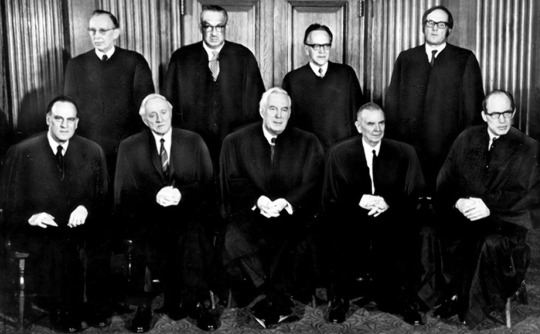
“Above all, society must grasp the grim relationship between unwanted children and the violent rebellion of minority groups.”- Larry Lader (one of the founders of NARAL)
“It’s not that obvious to some black women that abortion is the right decision. It’s only later on that poor or black women realize they don’t want more children tying them down. They need more pressure to abort.” - Michael Bracken (a white, male, abortion advocate.)
“The 54% of Black children born to unwed mothers are not productive members of society. Teenagers never make good mothers….single mothers have bad children.” - Nancy White (also NARAL.) <- literally wtf.
#pro life#i am the prolife generation#prolife#prolife feminist#feminism#feminist#womens rights#abortion#autistic#pro every life#politics#prolife feminism#fuck the patriarchy#fuck abortion#roe v wade#end abortion#history#first wave feminism#susan b. anthony#alice paul#elizabeth cady stanton#NARAL#anti abortion#antinatalism is stealth misogyny#misogyny#racism#eugenics#abortion is not healthcare#it’s fucking eugenics guys#Larry Lader was a fucking misogynistic racist
132 notes
·
View notes
Text
American Indian Discrimination and Issues
If you want the links to important causes just skip towards the end, but I implore you to read through what I’ve written as it’s important as well!
I think it’s a major disservice that barely anyone talks about the fact that the Federal Government doesn’t recognize members of tribes whose land was taken from them. Obviously most of the US is stolen land but in the mid 1900s the Federal government terminated Indian land rights to “assimilate” Indian people, and without an official land base it’s harder to congregate and act as a sovereign nation, therefore they aren’t eligible for federal recognition. Furthermore, in 1900 the Bureau of Indian Affairs didn’t do a complete consensus of the US and missed places where Indians lived, meaning members of indigenous communities were missed and not represented on the census data. One of the criterion to becoming a federally recognized tribe is the demonstration “that it has been identified as an American Indian entity on a substantially continuous basis since 1900.” (R. Lee Fleming, Director of the Office of Federal Acknowledgement).
Some of you may also be wondering why federal acknowledgement is so important. For starters, American Indians are the poorest ethnic group in the US. Federally recognized tribes are permitted to open up casinos in places that do not permit gambling because these tribes have the status of being a sovereign nation. While these casinos are able to provide for many Indian families and make improvements to reservations, this income isn’t extended to those with tribal ancestry who aren’t apart of those Federally recognized tribes. You also can’t get financial assistance from the Bureau of Indian Affairs if you’re not from a Federally recognized tribe. This means that any federal programs, health insurances, grants, reparations, etc. are not provided.
There is also a large chunk of American Indian history that is erased from the knowledge of the general public - such as the fact that they weren’t granted US citizenship until 1924, 56 years after African Americans were granted it, or the fact they were also subjected to Jim Crow laws and racial segregation in the South, or the Red Power movement as a whole.
I think it’s important to understand the struggles American Indians have faced and still face to this day - having the highest likelihood than any other race of being killed in a police encounter (3x the rate of White Americans, 2.6x the rate of Black Americans), having an incarceration rate 38% higher than the national average and receiving harsher sentences than White, Black, and Hispanic offenders, having the highest rate of violent crime victimizations compared to every other race with around 70% of those committing hate crimes not being of the same race as them, with 46% of the perpetrators being complete strangers to the victim, and 75% of sexual assaults against them being committed by strangers or acquaintances (according to the Bureau of Statistics )- whereas amongst the general population only 58.5% of sexual assaults are committed by strangers or acquaintances (RAINN).
They also have the lowest median household income out of all races in the US (data from 2022). Furthermore, the American Indian population is rarely mentioned in discussions about the racial wage gap despite the fact that they make nearly the same (only one cent more) earnings per dollar as Black Americans do (US Department of Labor) relative to White American earnings and having a lower share of income than every other race. Nor is it mentioned that American Indian women on average are paid less than Black Women (who are often more focused on by the media) when looking at the racial gender gap (National Partnership for Women and Families).
Another issue that is rarely addressed is the poor access and racism faced in terms of health care. The leasing causes of death for American Indians are heart disease (25% of deaths), cancer (22%), and accidents (19%). There are many diseases that affect American Indians at a higher rate than the general population as well. However, they also are more likely to not receive medical assistance because of the cost and much less likely to have visited a dentist as well, putting them more at risk for dental related illnesses. 33% of American Indians also do not have health insurance either. Furthermore, the Indian Health Service (the Federal Department dedicated to providing American Indians with Health Care services) has had its funding cut multiple times within the past two decades (with a $800,000,000 cut in 2013) making it harder to provide adequate health care for them.
I would also like to state that I’m not trying to diminish the discrimination, racism, and pain that other people of color undergo, nor am I trying to devalue or discredit their experiences. All people of color deserve justice and equality . I’m just trying to raise awareness to the fact that American Indians face a lot of discrimination at higher rates but are less focused on in the media. Overall, I just think that it’s important to draw more attention to the issues that they face and different ways to combat those issues.
Some American Indian Organizations and Causes to support are:
The Indigenous Media Freedom Alliance whose goal is to aid American Indians in being seen and heard in independent media. https://imfreedomalliance.org/
C.O.P.E. which aims to help Najavo people who live with chronic illnesses & improve the wellbeing of American Indians. https://www.copeprogram.org/aboutus
Land Back which fights for the return to indigenous lands in the US to their peoples. https://landback.org/
The American Indian Community House which aims to improve American Indian wellbeing and increase the visibility of American Indian cultures in urban settings. https://aich.org/about/
C.H.I.R.P. which originally served to research, preserve, and document the history & culture of the Nevada City Rancheria Nisenan Tribe. However, it now serves as a way to support their people after it was no longer recognized by the Federal government, leaving them without access to programs that support their health and well-being. https://chirpca.org/
Diné C.A.R.E. which defends Najavo communities against exploitative and destructive environmental practices and issues. https://www.dine-care.org/about-us
Hopi Relief Fund which aims to distribute the necessary supplies to aid community members in their recovery of the Covid-19 crisis. https://hopirelief.org/about-us
Indigenous Roots which uses art and activism to promote opportunities for Indigenous peoples, such as local classes, scholarships, artist grants, art installations, etc. https://indigenous-roots.org/
Intertribal Friend House whose mission is to expand resources for American Indians so that they can stay connected to their culture. https://www.ifhurbanrez.org/
The National Urban Family Coalition which advocates to bring awareness to the struggles that American Indians living in urban areas still face. https://www.nuifc.org/
R.J.I.P. which focuses on bringing justice to American Indian victims and addressing the disproportionate rates at which American Indians are victimized. https://www.indigenousjustice.org/
Sogorea Te’ Land Trust which focuses on returning Indigenous Land to indigenous people (similar to Land Back). https://sogoreate-landtrust.org/
N.A.D.L.C. which advocates for American Indians with disabilities. https://www.nativedisabilitylaw.org/
AISES https://www.aises.org/about/history
https://nativephilanthropy.candid.org/timeline/era/indian-self-determination-and-self-governance-era/#timeline-content
I also implore you to also check out these American Indian and Indigenous Businesses:
Cheek Bone Beauty https://www.cheekbonebeauty.com/
Sḵwálwen Botanicals https://skwalwen.com/
Prados Beauty https://pradosbeauty.com/
Ah-Shí Beauty https://www.ahshibeauty.com/
Satya Organic Skincare https://satyaorganics.com/
The Yukon Soaps Company https://yukonsoaps.com/
Blended Girl Cosmetics https://blendedgirl.com/
Sequoia Soaps https://sequoiasoaps.com/
Sister Sky (Haircare) https://sistersky.com/
Quw'utsun Made https://www.firstpickhandmade.com/personnel/quwutsun-made/
Ginew https://ginewusa.com/
B.yellowtail https://byellowtail.com/
Eighth Generation https://eighthgeneration.com/
Lauren Good Day https://laurengoodday.com/
Urban Native Era https://urbannativeera.com/
OXDX Clothing https://www.oxdxclothing.com/
Beyond Buckskin Boutique https://shop.beyondbuckskin.com/
Liandra Swim https://liandraswim.com/en-us
Lesley Hampton https://lesleyhampton.com/
Haus of Dizzy https://hausofdizzy.com/
#american indian#land back#american indian discrimination#racial justice#racial equality#racialdisparities#racial discrimination#indigenous#indigenous rights#american indian rights#indigenous movements#red power movement#indigenous history#american indian history#american indian businesses#indigenous business#indigenous businesses#american indian charities#indigenous charities
3 notes
·
View notes